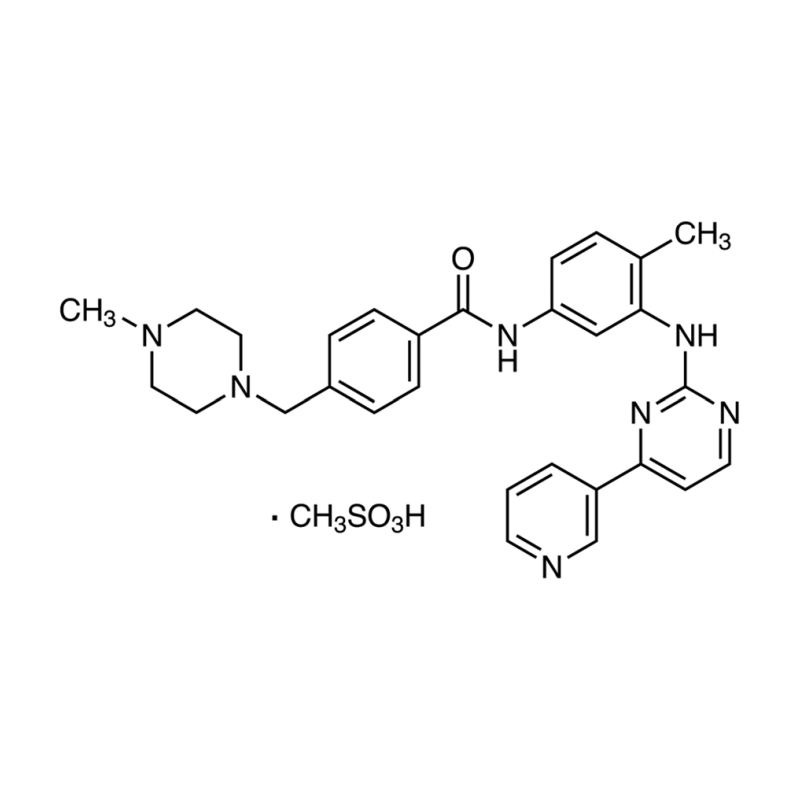产品
编 号:F277529
分子式:C30H35N7O4S
分子量:589.71
分子式:C30H35N7O4S
分子量:589.71
产品类型
规格
价格
是否有货
10mM*1mL in DMSO
询价
询价
200mg
400
In-stock
500mg
720
In-stock
5g
3960
In-stock
结构图

CAS No: 220127-57-1
产品详情
生物活性:
Imatinib Mesylate (STI571 Mesylate) is a tyrosine kinases inhibitor that inhibits c-Kit, Bcr-Abl, and PDGFR (IC50=100 nM) tyrosine kinases.
体内研究:
Animals treated with Imatinib Mesylate show a decrease of mean body weight throughout the whole study. Body weight loss is noticeable in mice from groups that receive chemotherapy and the vitamin D analog combined treatment. The body weight decrease of mice treat with both combined Imatinib mesylate and PRI-2191 is the highest (15%) on Day 22 of the experiment, but after that day, mice start to recover. In a rat Ischemia/reperfusion injury (IRI) model, Imatinib mesylate attenuates lung injury by an antipermeability and antiinflammatory effect. The delivery and function of Imatinib mesylate in the lung is also confirmed in this model.
体外研究:
Imatinib (STI571) Mesylate inhibits c-Kit autophosphorylation, activation of MAPK, and activation of Akt without altering total protein levels of c-kit, MAPK, or Akt. The concentration that produces 50% inhibition for these effects is approximately 100 nM. Imatinib (STI571) mesylate is very effective (in vitro IC50 of 25 nM) against the chronic myeloid leukemia-causing kinase Bcr-Abl. Imatinib also efficiently inhibits Kit (in vitro IC50, 410 nM) and PDGFR (in vitro IC50, 380 nM). Imatinib (STI571) mesylate is a multi-target inhibitor of v-Abl, c-Kit and inhibits Bcr/Abl, v-Abl, Tel/Abl, the native PDGFβ receptor, and c-Kit, but it does not inhibit Src family kinases, c-Fms, Flt3, the EGFR or multiple other tyrosine kinases. Imatinib inhibits tyrosine phosphorylation and cell growth of Ba/F3 cells expressing Bcr/Abl, Tel/Abl, Tel/PDGFβR, and Tel/Arg with an IC50 of approximately 0.5 μM in each case, but it has no effect on untransformed Ba/F3 cells growing in IL-3 or on Ba/F3 cells transformed by Tel/JAK2. Imatinib mesylate selectively inhibits the activity of Bcr/Abl, c-Kit and PDGFR kinases. Imatinib mesylate reveals distinct and rapid antileukemic activity in chronic myelogenous leukemia (CML) and Philadelphia-positive (Ph+) acute lymphoblastic leukemia (ALL).
Imatinib Mesylate (STI571 Mesylate) is a tyrosine kinases inhibitor that inhibits c-Kit, Bcr-Abl, and PDGFR (IC50=100 nM) tyrosine kinases.
体内研究:
Animals treated with Imatinib Mesylate show a decrease of mean body weight throughout the whole study. Body weight loss is noticeable in mice from groups that receive chemotherapy and the vitamin D analog combined treatment. The body weight decrease of mice treat with both combined Imatinib mesylate and PRI-2191 is the highest (15%) on Day 22 of the experiment, but after that day, mice start to recover. In a rat Ischemia/reperfusion injury (IRI) model, Imatinib mesylate attenuates lung injury by an antipermeability and antiinflammatory effect. The delivery and function of Imatinib mesylate in the lung is also confirmed in this model.
体外研究:
Imatinib (STI571) Mesylate inhibits c-Kit autophosphorylation, activation of MAPK, and activation of Akt without altering total protein levels of c-kit, MAPK, or Akt. The concentration that produces 50% inhibition for these effects is approximately 100 nM. Imatinib (STI571) mesylate is very effective (in vitro IC50 of 25 nM) against the chronic myeloid leukemia-causing kinase Bcr-Abl. Imatinib also efficiently inhibits Kit (in vitro IC50, 410 nM) and PDGFR (in vitro IC50, 380 nM). Imatinib (STI571) mesylate is a multi-target inhibitor of v-Abl, c-Kit and inhibits Bcr/Abl, v-Abl, Tel/Abl, the native PDGFβ receptor, and c-Kit, but it does not inhibit Src family kinases, c-Fms, Flt3, the EGFR or multiple other tyrosine kinases. Imatinib inhibits tyrosine phosphorylation and cell growth of Ba/F3 cells expressing Bcr/Abl, Tel/Abl, Tel/PDGFβR, and Tel/Arg with an IC50 of approximately 0.5 μM in each case, but it has no effect on untransformed Ba/F3 cells growing in IL-3 or on Ba/F3 cells transformed by Tel/JAK2. Imatinib mesylate selectively inhibits the activity of Bcr/Abl, c-Kit and PDGFR kinases. Imatinib mesylate reveals distinct and rapid antileukemic activity in chronic myelogenous leukemia (CML) and Philadelphia-positive (Ph+) acute lymphoblastic leukemia (ALL).
产品资料

